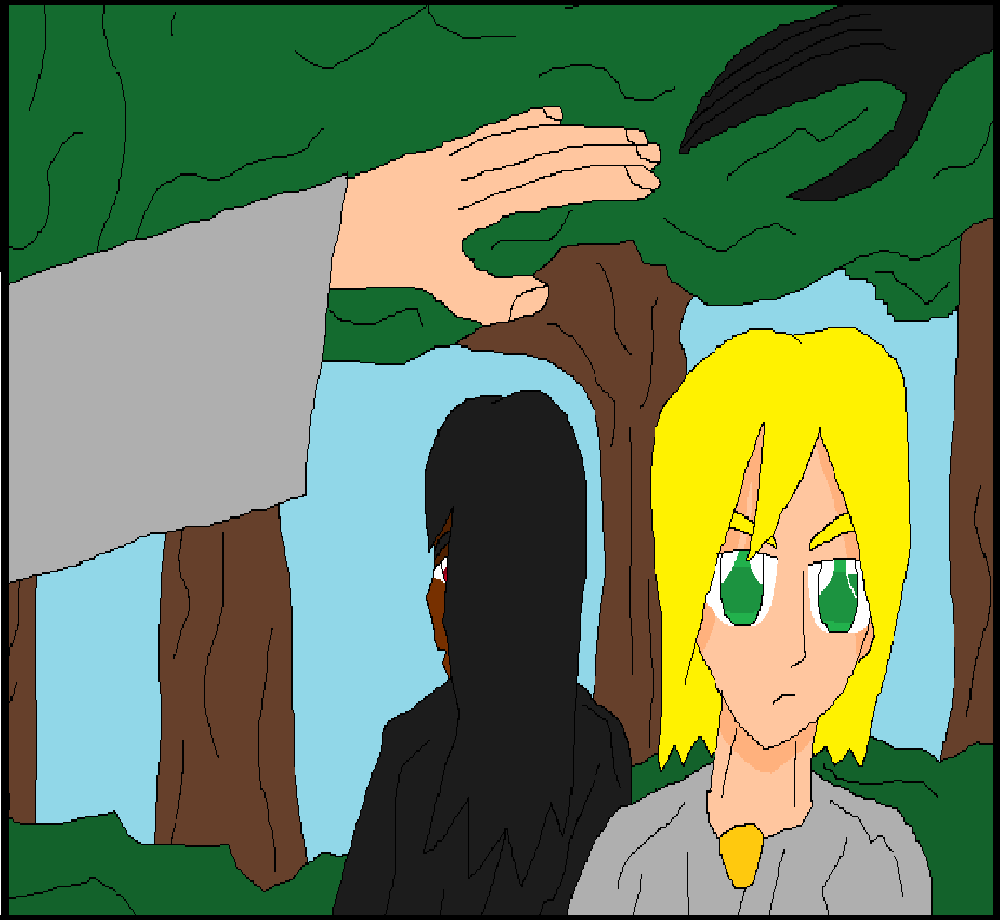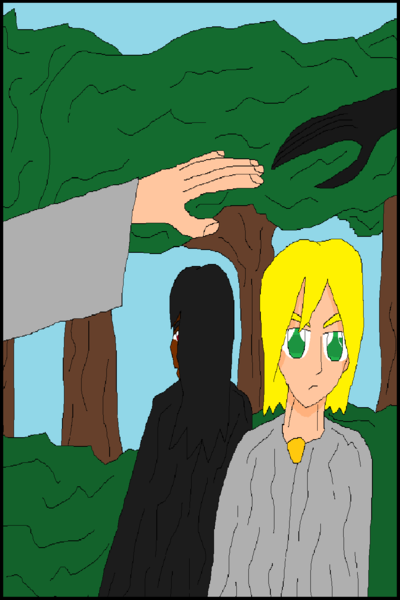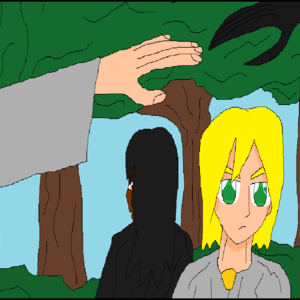Bjorn led a procession out of the hill while William and Felix tailed behind. Finally, the bodies of three dwarves were brought up to the top of a mountain. There, they were laid out on the roots of the great tree. And it was then that William saw that the tree's roots were mingled with many dwarvish bones. He felt a surge of horror.
It only deepened as the dwarves turned away and departed.
"Aren't you going to bury them?" asked William.
"We Nakmar dwarves do not bury our dead," said Bjorn. "Rather, we let nature take its course. We allow the beasts of Laevian and Typhos to feast on them so we will not invite their wrath. We mourn those we have been parted from away from the bodies of the fallen."
"But..." William faltered, "Surely they deserve the honor of burning, at least."
Bjorn looked at him strangely. "I have heard that Harlenorians and Calishans bury and cremate their ascended. It is a strange thing to do. Moreover, the ashes of the body cannot be eaten by animals. And in the dirt, they will be of little use."
"It is a matter of respect," said William.
"These are not our brethren," said Bjorn. "They have already left the dream. What remains is a shell, left behind and unmissed. But, come, the feast is soon to begin."
They returned to the hall as the final preparations were made. As they waited, William examined carvings on the wall. Carved into the stone were images of conflict. A shadow hunted in the dark, thirsting for blood. Unholy rituals brought forth monsters from beyond the veil of reality. They were snakelike creatures with scythes for arms.
Then came the girl. She appeared from the light, younger even than William. And where she walked, prisoners were liberated. She gradually got older as he went down the pictures until suddenly, he recognized her.
"Is that Kiyora?" asked William suddenly, things clicking into place.
"Yes," said Bjorn, "though we do not call her by that name often. The Dreaming Goddess came to us hundreds of years ago and helped us with many things. At first, her aid was small, finding lost livestock and such. She was very young then. Yet, as time passed, her powers became greater. And the deeds she performed became more extraordinary still. And she grew older, though she was slower to do so than even elves.
"Each time she appears, she is older. The real world, it seems, has a different time from our own." He paused as a dwarf came to whisper in his ears. "Excuse me, I must greet some other visitors."
As Bjorn departed, William looked to Felix. He remembered what Bjorn had revealed. Felix was related to Baltoth the Inexorable. And Baltoth, the most terrible enemy Harlenor had ever known. "So when were you going to tell me about your heritage?"
"Never," admitted Felix, "my great, great grandmother was a consort of Baltoth. He has a harem numbering in the thousands, counting his living concubines. It doesn't make me anything special."
"...All right," said William. "I'll say nothing to anyone." The demon god's depravity was well known. William wasn't going to judge Felix based on who his great-grandparents were. Soon enough, Bjorn returned, and with him came many other dwarves. They were led by a black-bearded dwarf who wore a crown of silver. His clothes were a sturdy make with a lot of furs. He eyed William and Felix doubtfully.
"Bjorn, who are these?" he asked.
"A son of Baltoth and his servant, nephew," said Bjorn.
Obviously, there had been a misunderstanding. "It is an honor to meet you," said William. "However, Felix is my servant."
Bjorn looked at him oddly, then at Felix. "Is this true?"
"It is a very long story, but yes," said Felix.
"I see," said Bjorn. "Yet I was led to believe that humans had their servants speak for them while they were in an unknown land."
"That is a Calishan custom," said Felix. "With Harlenorians, the custom is for the servant to say nothing. Their masters do all the speaking."
"Would it not be simpler for all to speak for themselves, as we do?" asked Bjorn's nephew.
"Perhaps," admitted William, "but it's a matter of tradition."
"A strange one," mused the nephew. "Yet no matter. I am Wiglaf Houndslasher, King of the Nakmar."
"I am William Gabriel, son of Duke Vanion Gabriel," said William. "My servant is Felix, a close friend of mine."
"I shall be very interested to hear your tale at the feast," mused King Houndslasher.
"Then let us not hold it up any longer," said Bjorn. "Under this house on this day, all are equals and may speak freely."
The dwarves all entered a side passage to gather around long tables. They numbered perhaps several hundred, and those were only the most prominent guests. There were others in other halls, drinking and eating just as merrily. William had a very fuzzy memory of the feast afterward. He remembered drinking delicious drinks and eating fantastic food. Dwarves were making mighty boasts of their heroic deeds.
While they did so, a group of robed dwarves wrote them down. They scratched their writings down with ink and quill on sheets of parchment in one corner. William guessed that these people needed to learn the techniques for making paper.
It was a recent innovation, though. It dates back to the beginning of Andoa II's reign in Antion. Though that was before William was born. Comparatively recent, then.
"Who are those dwarves, writing things down?" asked William.
"They are my priests," said Bjorn. "Among their duties is recording the tales of valor told in this hall. The hope is that future generations might know of their ancestor's greatness."
"I see," said William before he noticed something else. Two statues sat at the far end of the table, sitting in the place of the ruler. He wondered why. Shouldn't the King be seated at the head of the table? He decided it was not polite to ask.
"Tell me," said William, "what day are you celebrating?"
"Long ago," said Bjorn, "those now named Calishans were under the rule of the hated Dust Elves. Under their rule, they invaded Seathorius. As a result, many ancient trees were felled, and the dust elves sought to exterminate satyr and dwarves. So, they built a mighty citadel near the northern borders.
"Yet then Baltoth the Great, the Inexorable, the Mighty, arose from the river and laid low their armies. Then, with his sword in hand, he drove them from Seathorius singlehanded. Then, he rebuked us for our weakness and cursed the castle the dust elves had built.
"To this day, it stands, overgrown and haunted by unholy spirits. That is why we call it Baltoth's Retribution. It forever reminds us of our former weakness." He paused. "Yet there is a rumor, a tale, that there is an artifact of terrible and wonderful power within it."
William could not help but feel the conversation had changed subjects. Despite himself, he was curious. "What is this artifact?"
"A mirror," said Bjorn. "It is said that the one who looks into it will see a perfect truth. That is a perilous thing, indeed. For such a simple thing may break nations. Yet one who looked on themselves with eyes unclouded would emerge far stronger. So it is known as the Mirror of Laevian. Once, I quested for it when I was young."
"Did you find it?" asked William.
"Of course not," said Bjorn. "Or else it would no longer be a rumor. No, I arrived at Baltoth's Retribution after many perils and dangers. I found I could not take one step forward. I forced myself past my terror and got as far as the gate.
"Then I saw a being with wings like a dragon and eyes of blue flame. And a tail with a blade shaped like a crescent moon on it. So I fled, and to my shame, I have never been able to go back. The horror of that place is too intense for mere words to describe.
"Now, I am old."
"Yet surely someone powerful enough will force his or her way in," said Felix.
"They would have to be strong of will indeed." mused Bjorn. "And until a time when such a hero appears, the Mirror of Laevian will remain lost."
"Why wouldn't Baltoth just steal the thing when he sacked the place?" asked Felix.
"I do not know," admitted Bjorn. "He was not a god then. Perhaps some enchantment of the dust elves held him back, and now that he is a god, the mirror seems of little account. But, undoubtedly, he has many other matters to consider as ruler of half the world."
"But what are you celebrating?" asked William, losing patience.
"Oh yes, that was the original question, wasn't it?" asked Bjorn. "We celebrate the day when Baltoth arose from Savior's Run."
"I see," said William, glad to finally have an answer. "Is that why the satyrs didn't attack?"
"A long time ago," said Bjorn 'the satyrs never would have even considered a battle on this day. Yet they have since come under the sway of Melchious. He is a cruel and powerful demon who resides within this land. Years ago, there was actually a battle between us. Since then, we have held our celebrations below ground."
"There are many more dwarves here than before," noted Felix.
"What you see are visitors from many villages," said King Houndslasher. "We have learned to change our passages, so they all meet up on this day. Seathorius is far closer to the Dreaming Goddess than other parts. Thus it shifts and changes with her whims." He paused. "Tell me, what is the tale of your coming here? That alone has gone unspoken."
William remained silent for a moment. "All right, I ought to start from the beginning." It appeared they were in for a very long night.
William told them everything that happened. The words spilled from his mouth in an onslaught. It could have been a more neat and tidy story of the sort Rusara told; he often had to go back and explain points he had missed. He glossed over the battles; they could have been more interesting. Nor was he keen to remember them and had no talent for describing them. The bit that seemed to affect his audience the most was when he mentioned the dwarves the satyrs ate.
"So that was their fate," said Bjorn sadly. "I cautioned them not to cross the river and violate the truce. But, thirsting for an adventure, they would not listen.
"I will hope their next life has a happier end."
William continued his tale. He described his imprisonment and all his attempts to escape on his own. When he came to the appearance of the demoness, everyone seemed very interested. He must have told the story well, and he added a great many details.
"I think I know of this demoness," said King Houndslasher. "A lesser creature that serves Melchious. She came to this realm long ago. She ferries messages between his outposts. There are some on the other side of the river and those dwarves that serve him on this side.
"Sometimes, she commands raiding parties."
"If she serves Melchious, why was she offering to help me escape?" asked William.
"No doubt, they had some use in mind for you," said the King. "They must have created a crisis hoping to strike a bargain to get you out of it. Or perhaps she merely seeks to usurp her master; such things are not uncommon. It is at this stage a question we will likely never hear the end of. Continue."
There was an even greater interest when he got to the parts describing Kiyora. Murmurs of awe were common, and the dwarves writing it all down scribbled faster than was usual. When William was done, Felix was called upon to fully account for his side of events. Felix was far more verbose, dwelling on the glories of combat. His words excited the dwarves. William felt he told the tale far better than he had.
The duel with Doltier, if it could be called that, was made a swashbuckling battle for the ages. This rather than the one-sided affair it had really been. His friend seemed to delight in exaggerations, making for a perfect story. William was perplexed; he had not seen this side of Felix before.
The dwarves certainly liked it. But William noticed Felix skimmed over his escape from the satyrs and looked away. Even so, the dwarves were more excited about the whole thing. As they spoke of it, King Houndslasher seemed to be weighing something on his mind. "It is a good tale. I doubt Kiyora would favor you if it were not true. You have had a terrible journey, and I fear the worst may not be behind you. Seathorius only lets people go easily. Yet something troubles me.
"You seem to hold Melchious in a more personal dread than we do. What is the reason for this?" William opened his mouth to make a flat denial, and somehow, he doubted that the King would call him on it. But it would be a lie, even to himself, and since the dwarves had been so kind, he felt he owed them the truth. So he told it.











Comments (0)
See all